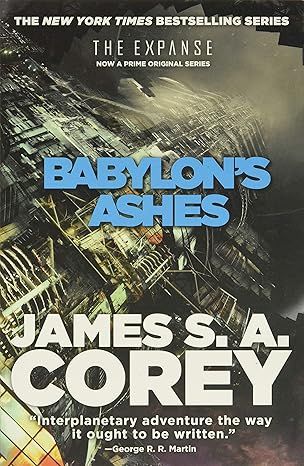Babylon's Ashes (The Expanse, 6)
4.5
-
29,838 ratings
The sixth book in the NYT bestselling Expanse series, Babylon's Ashes has the galaxy in full revolution, and it's up to the crew of the Rocinante to make a desperate mission to the gate network and thin hope of victory. Now a Prime Original series.
HUGO AWARD WINNER FOR BEST SERIES
A revolution brewing for generations has begun in fire. It will end in blood.
The Free Navy -- a violent group of Belters in black-market military ships -- has crippled the Earth and begun a campaign of piracy and violence among the outer planets. The colony ships heading for the thousand new worlds on the far side of the alien ring gates are easy prey, and no single navy remains strong enough to protect them.
James Holden and his crew know the strengths and weaknesses of this new force better than anyone. Outnumbered and outgunned, the embattled remnants of the old political powers call on the Rocinante for a desperate mission to reach Medina Station at the heart of the gate network.
But the new alliances are as flawed as the old, and the struggle for power has only just begun.
Babylon's Ashes is a breakneck science fiction adventure following the bestselling Nemesis Games.
The Expanse
- Leviathan Wakes
- Caliban's War
- Abaddon's Gate
- Cibola Burn
- Nemesis Games
- Babylon's Ashes
- Persepolis Rising
- Tiamat's Wrath
- Leviathan Falls
Memory's Legion
The Expanse Short Fiction
- Drive
- The Butcher of Anderson Station
- Gods of Risk
- The Churn
- The Vital Abyss
- Strange Dogs
- Auberon
- The Sins of Our Fathers
Kindle
$11.99
Available instantly
Audiobook
$0.00
with membership trial
Hardcover
$20.49
Paperback
$14.59
Ships from
Amazon.com
Payment
Secure transaction
ISBN-10
0316217646
ISBN-13
978-0316217644
Print length
576 pages
Language
English
Publisher
Orbit
Publication date
October 23, 2017
Dimensions
6 x 1.85 x 9.25 inches
Item weight
1.2 pounds
Frequently bought together
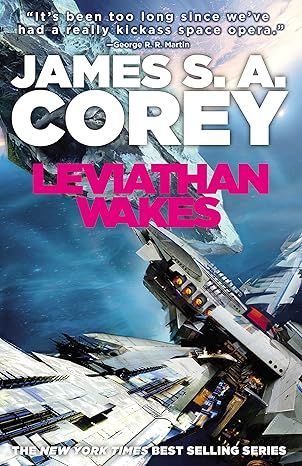
Leviathan Wakes (The Expanse, 1)
4.6
-
52,335
$11.24

Caliban's War (The Expanse, 2)
4.7
-
37,849
$12.92

Abaddon's Gate (The Expanse, 3)
4.6
-
34,117
$11.99

Cibola Burn (The Expanse, 4)
4.6
-
33,345
$11.99
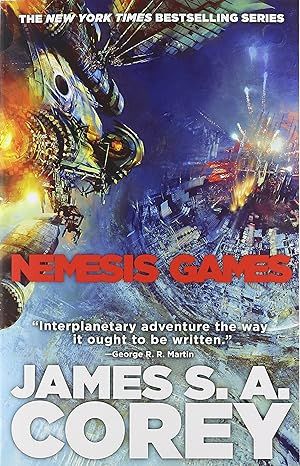
Nemesis Games (The Expanse, 5)
4.6
-
32,883
$11.99
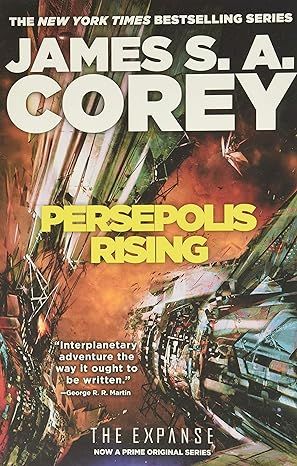
Persepolis Rising (The Expanse, 7)
4.6
-
25,957
$11.99
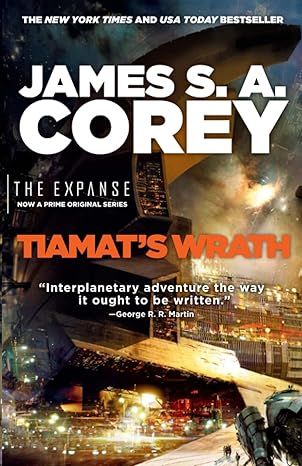
Tiamat's Wrath (The Expanse, 8)
4.8
-
27,918
$11.99
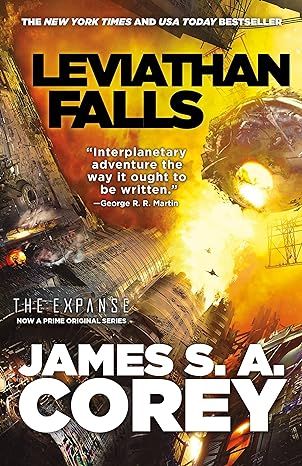
Leviathan Falls (The Expanse, 9)
4.8
-
25,849
$11.99
Popular Highlights in this book
Situations change and clinging too tightly to what came before kills you.
Highlighted by 1,797 Kindle readers
History, Michio believed, was a long series of surprises that seemed inevitable in retrospect.
Highlighted by 1,542 Kindle readers
All beautiful things should have just a little sorrow about them. Made them seem real.
Highlighted by 1,065 Kindle readers
Product details
ASIN :
B018S2773Y
File size :
1633 KB
Text-to-speech :
Enabled
Screen reader :
Supported
Enhanced typesetting :
Enabled
X-Ray :
Enabled
Word wise :
Enabled
Award Winners:
Editorial Reviews
This is a high-octane continuation of a series that has quickly become the biggest thing in science fiction.―The B&N Sci-Fi & Fantasy Blog on Babylon's Ashes
"The science fictional equivalent of A Song of Ice and Fire...only with fewer beheadings and way more spaceships."―NPR Books on Cibola Burn
"Combining an exploration of real human frailties with big SF ideas and exciting thriller action, Corey cements the series as must-read space opera."―Library Journal (Starred Review) on Cibola Burn
"The Expanse series is the best space opera series running at full tilt right now, and Cibola Burn continues that streak of excellence."―io9 on Cibola Burn
"Corey's splendid fourth Expanse novel blends adventure with uncommon decency."―Publishers Weekly (Starred Review) on Cibola Burn
"A politically complex and pulse-pounding page-turner.... Corey perfectly balances character development with action... series fans will find this installment the best yet."―Publishers Weekly on Abaddon's Gate
"It's been too long since we've had a really kickass space opera. Leviathan Wakes is interplanetary adventure the way it ought to be written, the kind of SF that made me fall in love with the genre way back when, seasoned with a dollop of horror and a dash of noir. Jimmy Corey writes with the energy of a brash newcomer and the polish of a seasoned pro. So where's the second book?"―George R. R. Martin on Leviathan Wakes
"An excellent space operatic debut in the grand tradition of Peter F. Hamilton."―Charles Stross on Leviathan Wakes
"High adventure equaling the best space opera has to offer, cutting-edge technology, and a group of unforgettable characters bring the third installment of Corey's epic space drama (after Caliban's War and Leviathan Wakes) to an action-filled close while leaving room for more stories to unfold. Perhaps one of the best tales the genre has yet to produce, this superb collaboration between fantasy author Daniel Abraham and Ty Franck should reawaken an interest in old-fashioned storytelling and cinematic pacing. Highly recommended."―Library Journal on Abaddon's Gate
"Literary space opera at its absolute best."―io9.com on Abaddon's Gate
"[T]he authors are superb with the exciting bits: Shipboard coups and battles are a thrill to follow."―Washington Post on Abaddon's Gate
"Riveting interplanetary thriller."―Publishers Weekly on Leviathan Wakes
"A standout tale of violence, intrigue, ambition, and hope. ... Corey cranks up the tension relentlessly in this fast-paced story of heroes and rebels fighting for freedom. With enough thrills and intrigue for three Hollywood blockbusters, the novel stands alone nicely, making it easy for new readers as well as diehard series fans to dive right in."―Publishers Weekly on Nemesis Games
Read more
Sample
Prologue: Namono
The rocks had fallen three months ago, and Namono could see some blue in the sky again. The impact at Laghouat—first of the three strikes that had broken the world—had thrown so much of the Sahara into the air that she hadn’t seen the moon or stars for weeks. Even the ruddy disk of the sun struggled to penetrate the filthy clouds. Ash and grit rained down on Greater Abuja until it piled up in drifts, changing her city to the same yellow-gray as the sky. Even as she’d helped the volunteer teams to clear the rubble and care for the injured, she’d understood that her wracking cough and the black phlegm she spat out came from breathing in the dead.
Three and a half thousand kilometers stretched between the crater where Laghouat had been and Abuja. The shock wave still had blown out windows and collapsed buildings. Two hundred dead in the city, the newsfeeds said, four thousand wounded. The medical clinics were swamped. If you were not in immediate distress, please stay home.
The power grid degraded quickly. There was no sun to drive the solar panels, and the gritty air fouled the wind farms faster than the teams could clean them. By the time a fusion reactor was trucked north from the yards at Kinshasa, half of the city had spent fifteen days in the dark. With the hydroponic houses and hospitals and government buildings taking precedence, there were still brownouts more days than not. Network access through their hand terminals was spotty and unreliable. Sometimes they were cut off from the world for days at a time. It was to be expected, she told herself, as if any of this could have been foreseen.
And still, three months in, there came a break in the vast, blindfolded sky. As the reddened sun slid toward the west, the city lights of the moon appeared in the east, gems on a field of blue. Yes, it was tainted, dirty, incomplete, but it was blue. Nono took comfort in it as she walked.
The international district was recent, historically speaking. Few of the buildings were over a hundred years old. A previous generation’s fondness for wide thoroughfares between thin, mazy streets and curved, quasi-organic architectural forms marked the neighborhoods. Zuma Rock stood above it all, a permanent landmark. The ash and dust might streak the stone, but they could not change it. This was Nono’s hometown. The place she’d grown up, and the place she’d brought her little family back to at the end of her adventures. The home of her gentle retirement.
She coughed out a bitter laugh, and then she just coughed.
The relief center was a van parked at the edge of a public park. It had a leafy trefoil icon on its side, the logo of the hydroponic farm. Not the UN, not even basic administration. The layers of bureaucracy had been pressed thin by the urgency of the situation. She knew she should have been grateful. Some places, vans didn’t come at all.
The pack of dust and ash had made a crust over the gently sloping hills where the grass had been. Here and there, jagged cracks and furrows like vast snake tracks showed where children had tried to play anyway, but no one was sliding down it now. There was only the forming queue. She took her place in it. The others that waited with her had the same empty stare. Shock and exhaustion and hunger. And thirst. The international district had large Norwegian and Vietnamese enclaves, but no matter the shade of their skin or the texture of their hair, ash and misery had made a single tribe of them all.
The side of the van slid open, and the queue shifted in anticipation. Another week’s rations, however thin they might be. Nono felt a little stab of shame as her turn came near. She’d lived her whole life without ever needing basic. She was one of those who provided for others, not one who needed support. Except that she needed support now.
She reached the front. She’d seen the man handing out the packs before. He had a wide face, brown speckled with black freckles. He asked her address, and she gave it. A moment’s fumbling later, he held out a white plastic pack to her with the practiced efficiency of an automaton, and she took it. It felt terribly light. He only made eye contact with her when she failed to move away.
“I have a wife,” Namono said. “A daughter.”
A flash of raw anger rose in his eyes, hard as a slap. “If they can make the oats grow faster or conjure rice out of thin air, then do send them to us. Else, you’re holding us up.”
She felt tears welling up in her eyes, stinging them.
“One to a household,” the man snapped. “Move on.”
“But—”
“Go on!” he shouted, snapping his fingers at her. “There’s people behind you.”
She stepped away and heard him mutter something obscene at her as she left. Her tears weren’t thick. Hardly enough to wipe away. It was only that they stung so much.
She tucked her relief pack under her arm and, as soon as her eyes had recovered enough to see, put down her head and started home again. She couldn’t linger. There were others more desperate or less principled than herself who were waiting at the corners and in the doorways for the chance to steal water filters and food from the unwary. If she didn’t walk with purpose, they might mistake her for a victim. For a few blocks, her starved and exhausted mind entertained itself with fantasies of fighting off thieves. As if the catharsis of violence might somehow bring her to peace.
When she’d left their rooms, she’d promised Anna that she’d stop by Old Gino’s on the way home and make sure the elderly man was getting to the relief van. But when she reached the turn, she kept going straight. Weariness was already sucking at her marrow, and the prospect of propping the old man up and going back through the queue with him was more than she could face. She’d say she forgot. It would almost be true.
At the curve that led from the wide avenue into the residential cul-de-sac that was home, she found the violent fantasies in her mind had shifted. The men she imagined herself beating until they apologized and begged her forgiveness weren’t thieves, but the freckled relief man. If they can make the oats grow faster. What was that supposed to mean, anyway? Had he been joking about using their bodies as fertilizer? Had he dared to make a threat against her family? Who in hell did he think he was?
No, a voice said in her mind, as clearly as if Anna had been there to speak the words. No, he was angry because he wanted to help more, and he couldn’t. Knowing that all you can give isn’t enough is its own burden. That was all. Forgive him. Namono knew that she should, but she didn’t.
Their house was small. A half dozen rooms pressed together like a child squeezing a handful of damp sand. Nothing quite lined up; no corner was perfectly square. It gave the space the feel of something natural—a cave or a grotto—more than something built. She paused before she opened the door, trying to clear her mind. The setting sun had fallen behind Zuma Rock, and the grit and smoke in the air showed where the wide beams of light streamed past it. It looked like the stone had a halo. And in the darkening sky, a pinpoint of light. Venus. Tonight, there might be stars. She latched onto the thought like a lifeboat in the sea. There might be stars.
Inside, the house was clean. The rugs had been shaken out, the brick floors swept. The air smelled of lilac thanks to the little sachet-and-candle that one of Anna’s parishioners had brought them. Namono wiped away the last of her tears. She could pretend the redness in her eyes was only the outside air. Even if they didn’t believe her, they could pretend to.
“Hello?” she called. “Is anyone home?”
Nami squeaked from the back bedroom, her bare feet slapping on the brick as she barreled toward the door. Her little girl wasn’t so little anymore. She came up to Nono’s armpit now. Or Anna’s shoulder. The gentle pudge of childhood was gone, and the awkward coltish beauty of adolescence was clearing its throat. Her skin was barely lighter than Nono’s and her hair was as rich and kinky, but the girl had a Russian smile.
“You’re back!”
“Of course I am,” Nono said.
“What did we get?”
Namono took the white relief package and pressed it into her daughter’s hands. With a smile that was like complicity, she leaned close. “Why don’t you go find out, and then come tell me?”
Nami grinned back and loped off to the kitchen as if the water recyclers and fast-grown oats were a brilliant present. The girl’s enthusiasm was vast and partly sincere. The other part was to show her mothers that she was all right, that they didn’t need to worry for her. So much of their strength—all their strengths—grew from trying to protect each other. She didn’t know if that made it better or worse.
In the bedroom, Anna lay on her cushions. A thick volume of Tolstoy rested beside her, its spine bent by being reread. War and Peace. Her complexion was grayish and drawn. Nono sat beside her carefully, putting her hand on the exposed skin of her wife’s right thigh just above where her knee had been crushed. The skin didn’t feel hot anymore, and it wasn’t stretched drum-tight. Those had to be good signs.
“The sky was blue today,” Nono said. “There may be stars out tonight.”
Anna smiled her Russian smile, the one her wife’s genes had also given Nami. “That’s good, then. Improvement.”
“God knows there’s room for it,” Namono said, regretting the discouragement in her voice even as she spoke. She tried to soften it by taking Anna’s hand. “You’re looking better too.”
“No fever today,” Anna said.
“None?”
“Well, only a little.”
“Many guests?” she asked, trying to keep her tone light. After Anna’s injury, her parishioners had made such a fuss, bringing by tokens and offers of support until it was impossible for Anna to rest. Namono had put her foot down and sent them away. Anna had allowed it mostly, she thought, because it also kept her flock from giving away the supplies they couldn’t afford to do without.
“Amiri came by,” Anna said.
“Did he? And what did my cousin want?”
“We’re having a prayer circle tomorrow. Only about a dozen people. Nami helped clean the front room for it. I know I should have asked you first, but …”
Anna nodded at her distended, swollen leg as if her inability to stand at the pulpit was the worst thing that had happened to her. And maybe it was.
“If you’re strong enough,” Namono said.
“I’m sorry.”
“I forgive you. Again. Always.”
“You’re good to me, Nono.” Then, softly so that Nami couldn’t hear them, “There was an alert while you were out.”
Namono’s heart went cold. “Where’s it going to hit.”
“It won’t. They got it. But …”
The silence carried it. But there had been another one. Another rock thrown down the gravity well toward the fragile remnants of the Earth.
“I didn’t tell Nami,” Anna said, as if protecting their child from the fear was another sin that required forgiveness.
“It’s all right,” Namono said. “I will if we need to.”
“How is Gino?”
I forgot floated at the back of Namono’s throat, but she couldn’t speak the lie. To herself, maybe, but Anna’s clear eyes forbade it. “I’m going there next.”
“It’s important,” Anna said.
“I know. It’s just that I’m so tired—”
“That’s why it’s important,” Anna said. “When the crisis comes, we all pull together naturally. It’s easy then. It’s when things drag on too long that we have to make the effort. We need to make sure everyone sees we’re all in this together.”
Unless another rock came and the Navy didn’t catch it in time. Unless the hydroponics collapsed under the strain and they all went hungry. Unless the water recyclers failed. Unless a thousand different things happened, any one of which meant death.
But even that wouldn’t be failure for Anna. Not as long as they were all good and kind to each other. If they helped carry each other gently into the grave, Anna would feel she was following her calling. Perhaps she was right.
“Of course,” Namono said. “I just wanted to bring the supplies back to you first.”
Nami rushed in a moment later, a water recycler in either hand. “Look! Another glorious week of drinking cleaned-up piss and filthy rainwater!” she said with a grin, and it struck Namono for the millionth time what a perfect distillation of her mothers their daughter could be.
The rest of the package was oatmeal pucks ready to be cooked, packets of something that claimed in Chinese and Hindi to be chicken stroganoff, and a handful of pills. Vitamins for all of them. Painkillers for Anna. So that was something.
Namono sat with her wife, holding her hand until Anna’s eyelids began to droop and her cheeks took on the softness that spoke of coming sleep. Through the window, the last of the twilight glowed red, fading to gray. Anna’s body relaxed a degree. The tightness in her shoulders released. The furrows in her brow smoothed. Anna didn’t complain, but the pain of her injury and the stress of being suddenly crippled had mixed with the fear they all shared. It was a pleasure to watch it all fall away, if only for a moment. Anna was always a handsome woman, but when she slept, she was beautiful.
Nono waited until her wife’s breath was deep and regular before she rose from the bedside. She was almost to the door when Anna spoke, her voice rusty with sleep.
“Don’t forget Gino.”
“Going there now,” Nono said softly, and Anna’s breath went back to its deep sleep-slow tide.
“Can I come too?” Nami asked as Nono went back to their street door. “The terminals are down again, and there’s nothing to do here.”
Nono considered It’s too dangerous out there and Your mother might need you, but her daughter’s eyes were so hopeful. “Yes, but put your shoes on.”
The walk back to Gino’s was a dance in shadows. Enough sunlight had struck the emergency lights’ solar panels that half the houses they passed were glowing a little from within. Not much more than a candle’s brightness, but more than there had been. The city itself was still black. No streetlights, no glow in the skyscrapers, and only a few bright points along the sinuous length of the arcology to the south.
Namono had the sudden, powerful memory of being younger than her own daughter was now and going up to Luna for the first time. The utter brilliance of the stars and the starkly beautiful Milky Way. Even with the dust grit still in the high air above them, there were more stars out now than when the light pollution of the city had drowned them. The moon shone: a crescent of silver cupping a webwork of gold. She took her daughter’s hand.
The girl’s fingers seemed so thick, so solid compared to what they had once been. She was growing up. Not their little baby anymore. There had been so many plans for her university and traveling together. All of them gone now. The world they’d thought they were raising her in had vanished. She felt a twinge of guilt about that, as if there were something that she could have done to stop all this from happening. As if it were somehow her fault.
In the deepening darkness, there were voices, though not so many as there had been. Before, there had been some nightlife in the quarter. Pubs and street performers and the hard, rattling music recently come into fashion that clattered out into the street like someone spilling bricks. Now people slept when the darkness came and rose with the light. She caught the smell of something cooking. Strange how even boiled oats could come to mean comfort. She hoped that Old Gino had gone to the van, or that one of Anna’s parishioners had gone for him. Otherwise Anna would insist that he take part of their supplies, and Namono would let her.
But it hadn’t happened yet. No need to call for trouble before it came. There was enough on the road already. When they reached the turn to Old Gino’s street, the last of the sunlight was gone. The only sign that Zuma Rock was even there was a deeper darkness rising up thousands of meters above the city. The land itself raising a defiant fist to the sky.
“Oh,” Nami said. Not even a word so much as the intake of breath. “Did you see it?”
“See what?” Namono asked.
“Shooting star. There’s another one. Look!”
And yes, there among the fixed if flickering stars, a brief streak of light. And then another. While they stood there, hand in hand, a half dozen more. It was all she could do not to turn back, not to push her daughter into the shelter of a doorway and try to cover her. There had been an alert, but the remnants of the UN Navy had caught this one. These smears of fire across the upper atmosphere might not even be the debris from it. Or they might.
Either way, shooting stars had been something beautiful once. Something innocent. They would not be again. Not for her. Not for anyone on Earth. Every bright smear was a whisper of death. The hiss of a bullet. A reminder as clear as a voice. All of this can end, and you cannot stop it.
Another streak, bright as a torch, that bloomed out into a silent fireball as wide as her thumbnail.
“That was a big one,” Nami said.
No, Namono thought. No it wasn’t.
Read more
About the authors
James S. A. Corey
James S. A. Corey is the pen name of fantasy author Daniel Abraham, author of the critically acclaimed Long Price Quartet, and writer Ty Franck. They both live in Albuquerque, New Mexico.
Reviews
Customer reviews
4.5 out of 5
29,838 global ratings
Kim Wilson Owen
5
Whole series. Must read.
Reviewed in the United States on May 14, 2021
Verified Purchase
The Expanse series was my comfort a few years ago, during a time when I was seriously physically unwell. To me they are the best, up there with Dune, His Dark Materials, the works of Jo Walton, and Connie Willis. They are the fine steak and perfectly roasted vegetables, or the perfectly seasoned stew of beans and vegetables, of books- not just complete intellectual protein, but rich with the flavors of near future characters, future politics and the problems of humanity as very likely potential outcomes as a reflection of the issues we grapple with today, science of space travel and life that is plausible and thoughtful. I love these books. I last finished the series before later ones came out. I was pleased to find there were more, but anxious that they would just be a disappointment after the riches of the earlier books. These later ones are still riveting and satisfying. I would absolutely say please read the books before watching the show. But in this case we have the beyond rare luxury of a TV series that parallels the riches of the books and does justice to them, as its own standalone work of art. The series only enriches the Expanse. Which does not seem possible since the books are so good. I do not appreciate the white earth guy saves the world aspect of them, so my next stop is a return to the amazing Octavia Butler, with more insight into our society than I had when reading her work as a child. Meanwhile, The Expanse held me tight with 1. The other compelling characters and philosophical cultural and scientific quandaries in the series, and 2. By this point the books are more fully than ever fully acknowledging and making clear, and the TV series framed right out of the gate, the human problems of colonialism, ethnic and gender oppression, marginalization of "other" - when "other" is just a dangerous construct- disconnection from each other, might makes right, and greed that humanity is likely to be stuck with as long as we exist... but that we may also be able to recognize and heal. So... it just keeps getting better and I don't look forward to the end of the series, TV or novels. But I'm the richer for having experienced them. And I wonder how many times I'll keep re reading and re watching. I'll have to grieve for a while when there are no more episodes novellas or novels.. but after that I'll be back to my happy place.
Read more
2 people found this helpful
H. Grove (errantdreams)
5
On tribes and families
Reviewed in the United States on July 15, 2021
Verified Purchase
James S.A. Corey’s Babylon’s Ashes (The Expanse, 6) follows on the heels of his Nemesis Games. Earth is in dire straights after the “Free Navy” bombarded it with asteroids. Billions are dead and the rest are refugees living under falling ash and dirt. Filip, Naomi’s son, now knows she’s still alive–and he blames Holden for her having left him and his father, even though Holden had nothing to do with it. Medina Station (in the middle of the alien gates) has been repurposed as a sort of Belter homeland, while Captain Michio Pa thinks maybe there’s something wrong about following Marco (Naomi’s ex and the architect of the current disasters). The Rocinante and her crew are on their way to confront a ship that may be the one hurling rocks at Earth, and they have Bobbie on board now. And Marco’s true colors are showing through–he claims to be working for the benefit of the Belters, but he’s all too happy to abandon them as it suits his goals.
We’re getting to see the effects of the war on various people, governments, and sectors. A couple of old characters from a previous book (Pastor Anna and her family) make a reappearance as refugees on Earth. We get to see Avasarala interacting with one of her granddaughters (I may have cried a little). Prax shows up briefly regarding a particularly useful new strain of yeast that could help ease Earth’s hunger crisis.
I love the fact that relationships include a variety of orientations and situations. Pastor Anna has a wife. Michio Pa is in a plural marriage that’s accepted as perfectly normal by those around them. Holden and Naomi have never bothered getting married despite the closeness and length of their relationship. Holden’s eight parents are also in a plural marriage, although it’s partially for convenience.
This entire book, actually, is about tribes and families (really, so is the entire series), of every kind. Marriages, parent-child relationships, romantic love, and more get explored against a magnificent backdrop of military science fiction with plenty of action. There’s also a good theme of whether humanity deserves to be admired or reviled, and where that line lies.
The big problem coming up is the viability of the new economy. One of Marco’s advisors is very clear on the fact that certain things have to be accomplished by certain times in order to make sure that the Belt becomes self-sustaining within five years, which is how much time they have before the situation becomes critical. Unfortunately, Marco doesn’t entirely care about such worldly matters, so not everything is getting done.
It’s also fascinating to explore one station that’s taken over by the Free Navy and how the people there live–the ones who support the Free Navy, the ones who don’t, and the ones who just want to do their jobs and live in peace.
This is a great continuation of the series!
Read more
3 people found this helpful
Erik
5
A really friggin' great series
Reviewed in the United States on May 9, 2024
Verified Purchase
I just really like these books. It reminds me of when I was just a kid, 10 or so, reading the early Asimov and Heinlein stuff. Just well put together and so far as of this 6th book not getting repetitious or obvious. Well worth it, both time and dollars
Light C.
5
Another impressive story in the Expanse Universe
Reviewed in the United States on September 24, 2021
Verified Purchase
Once again, I couldn’t put the book down once I got started, even with all the stuff I had going on in my life, I was still able to read the entire novel in less then 3 days. It would have been less, except life, sleep and other things intruded.
I really enjoyed this novel due to the use of the various differing viewpoints it shared. I thought it was very well done that so many past characters each would get an occasional chapter, and possibly even show how their interactions with how the Roci crew impacts their current lives, even still, years later.
A good example of this was Prax. An obviously intelligent man who usually just keeps his head down and most of his enjoyment in life is either his daughter, his new family or his dataset runs while tweaking the biology of plants and systems with his expertise and knowledge. That his past made him aware when things changed this time on Ganymede was well said. That he decided to act because of simple outreach videos that originally started with Holden, was a great tie-in.
The Expanse series is good at showing the basic pettiness of humanity as well as the best that some strive for. I always hope that in our real lives we get more of the best, but sadly it seems the petty and harsh parts seem to always get the limelight. It makes the novel a lot more realistic because it shows humanity is still both, petty and magnanimous.
I find the stories of people’s relationships to be very believable as our culture continues to change and grow. How the authors give the reasoning behind group marriages was a well thought out and believable concept. Such as for Holden’s family that allowed them to have their land and farm but also allowed them to bring a child into the world, wherein if it was just a couple, it likely couldn’t have occurred. Pa’s marriage family but also being her shipmates under her as captain, or just having Holden make the Roci crew into a family unit, different then Pa’s but similar.
The one area I find pushing the boundaries of believability is that Holden and the Roci are always in the perfect spot and the right time or that suddenly they figure out a necessary puzzle’s answer that saves them at the last minute. Like with the gate system and missing ships. With as many ships that had disappeared, it seems unlikely Naomi would be the first to get the data to find the necessary cause of it, and then reproducing it so quickly as needed. I understand they are the heroes of the story and they need to be central to the action and to find a way to save the day, but there is believability and then there is just wishful fantasy. I wish they brought the realities back in line and not just create a magic answer when it’s needed, no matter how much foreshadowing they do throughout to get you to this magic response. At least in the previous novels, you could blame some of the last minute saves and spectacular scenarios that occurred on the alien protomolecule and Miller as the architect using Holden. This one didn’t have that ready made excuse though.
Though this is a work of fiction, with the exception of the above comment, I can easily see this is how our race could evolve when we finally are able to reach for the stars. When we do get there, I hope that we have a lot more people like the Roci crew and people like Prax, Pastor Anna, Bobbie Draper and Avasarala and less of those like Marcos Inaros. Though likely it will be a mix of both just as this series shows it, I will continue to hope for more of the better qualities as humanity grows.
Read more
4 people found this helpful
Joe Karpierz
5
great deeds, space battles
Reviewed in the United States on February 11, 2017
Verified Purchase
Looking forward to a new novel in James S.A. Corey's Expanse space opera series has become an annual event in my household, and it was no different with the 6th and latest entry in the series, BABYLON'S ASHES. I might also point out that every time an announcement came out that the novel was delayed there was much anguish not only here at the homestead in Illinois but in Colorado as well with the other half of the Duel Fish Codices pair wailing loudly enough to be heard all the way back to Chicagoland (okay, that's a bit of an exaggeration, but you get the point). The Expanse is that seemingly rare breed of action, heroism, great deeds, space battles, terrific characterization, and excellent writing that your high school English teacher, who may not approve of you reading science fiction, would be fond of.
When last we left the Expanse universe, the Earth was a planet in ruins. The Free Navy, led by Marco Inaros, has dumped rocks onto the planet's surface, destroying the planet's infrastructure and killing millions. His goal is to remake the political structure of the Solar System. He has begun attacking colony ships, those vessels heading for the ring gates to get out of the Solar System and start new lives of their own. He feels his people, the Belters, have been given the short straw all throughout their existence, and it's time to start a new regime with his people on the top of the food chain. The Earth and the Martian Navy are weak and without enough power to stop him - and pretty much everyone in the Solar System other than his own people want to stop him. Even some of his own people are turning against him. But Inaros is power mad and a megalomaniac who sees that he can do no wrong, that his plan is the best for his people. It will succeed.
Of course, this is where James Holden and the rest of the crew of the Rocinante come in. What's left of the Earth and Martian governments - let's face it, for all intents and purposes, this means my personal favorite character of the entire series, Chrisjen Avasarala - enlist the aid of the crew if the Roci to try to take over Medina Station out at the Rings to attempt to stop Inaros from wreaking even more havoc. And while they're out there, Holden and the crew discover something that is more sinister and worrying than the Free Navy (and thus setting things up for the next book, PERSEPOLIS RISING, presumably to be published later this year (and thus restarting the whole looking forward to a new Expanse novel thing I wrote earlier in this review).
BABYLON'S ASHES is quite a departure from the previous two books in the series, 2014's CIBOLA BURN and 2015's NEMESIS GAMES. CIBOLA BURN took us outside the Solar System for the first time, going to a colony planet where Holden has to play - what else? - peacemaker. NEMESIS GAMES brought us back to the Solar System, but more importantly had a very small cast of characters - basically the crew of the Rocinante itself - who have to deal with their own personal struggles while the Solar System collapses around them. In BABYLON'S ASHES, the whole world has already crumbled around them, and they are charged with trying to pick up the pieces. To tell this story requires a massive cast of characters, several subplots and storylines, and just a whole lot of juggling of things not only for the characters but the authors (Ty Frank and Daniel Abraham, the writers who collectively make up James S.A. Corey) themselves.
I'm not completely convinced that Corey could have written this novel six years ago when the series began with LEVIATHAN WAKES. As the series has gone on, Corey has grown as a writer - which in part means, I'm sure, that Frank and Abraham have gotten the collaboration act down to an art form (or maybe a science - who knows?) and can feed off each other really well. LEVIATHAN WAKES was terrific because it was the type of story a lot of us have been waiting for, but BABYLON'S ASHES is that and a whole lot more. Corey manages to weave intricate plotting with characters that we care about in a feat of one handed juggling that is a sight to behold.
Yeah, I loved the book. Can you tell?
So, Jefferson Mays. I cannot possibly say enough about his narration of the book. I look forward to listening to these books almost as much as I do reading them in the physical form. His voice is perfect for the story. His voicing of Chrisjen Avasarala is the single, biggest reason I'm going to miss that character when the series ends, supposedly, after the ninth book. Every time a chapter that featured Avasarala began, a smile came across my face. Mays voicing her profane, no holds barred character is perfect.
The Expanse novels keep getting better. Trust me. We'll all be looking forward to the next book.
Read more
10 people found this helpful
Top James S. A. Corey titles

Abaddon's Gate (The Expanse, 3)
4.6
-
34,117
$11.99

Leviathan Falls (The Expanse, 9)
4.8
-
25,849
$11.99

Tiamat's Wrath (The Expanse, 8)
4.8
-
27,918
$11.99

Persepolis Rising (The Expanse, 7)
4.6
-
25,957
$11.99

Nemesis Games (The Expanse, 5)
4.6
-
32,883
$11.99

Cibola Burn (The Expanse, 4)
4.6
-
33,345
$11.99

Caliban's War (The Expanse, 2)
4.7
-
37,849
$12.92

Leviathan Wakes (The Expanse, 1)
4.6
-
52,335
$11.24
Best Sellers

The Tuscan Child
4.2
-
100,022
$8.39

The Thursday Murder Club: A Novel (A Thursday Murder Club Mystery)
4.3
-
155,575
$6.33

Sapiens: A Brief History of Humankind
4.6
-
140,302
$13.49

The Butterfly Garden (The Collector, 1)
4.3
-
88,556
$9.59

Things We Hide from the Light (Knockemout Series, 2)
4.4
-
94,890
$11.66

The Last Thing He Told Me: A Novel
4.3
-
154,085
$2.99

The Perfect Marriage: A Completely Gripping Psychological Suspense
4.3
-
143,196
$9.47

The Coworker
4.1
-
80,003
$13.48

First Lie Wins: A Novel (Random House Large Print)
4.3
-
54,062
$14.99

Mile High (Windy City Series Book 1)
4.4
-
59,745
$16.19

Layla
4.2
-
107,613
$8.99

The Locked Door
4.4
-
94,673
$8.53
